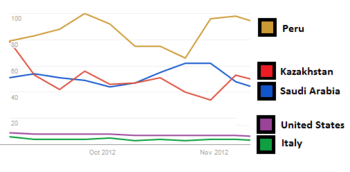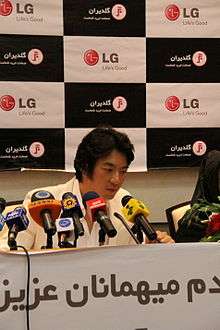Hallyu
| Hallyu | |
|---|---|
| Hangıl | 한류 |
| Hanja | 韓流 |
| Latin harfleriyle yazımı | Hanryu[1] |
Kore Dalgası (hangul=한류 hanja=韓流, ![]() listen , kelimenin tam anlamı 'flow of Korea') 1990'lardan beri devam eden popüler Kore kültürünün dünya geneline yayılmasıdır.[2][3][4] ilk olarak K-drama ve K-pop dah çok Doğu, Güney ve Güneydoğu Asya da bilinen Kore dalgası daha sonra internet,sosyal medya ve YouTube'da bulunan K-pop videoları ile tüm dünyaya yayılmaya başlamıştır.[5][6][7][8][9]
listen , kelimenin tam anlamı 'flow of Korea') 1990'lardan beri devam eden popüler Kore kültürünün dünya geneline yayılmasıdır.[2][3][4] ilk olarak K-drama ve K-pop dah çok Doğu, Güney ve Güneydoğu Asya da bilinen Kore dalgası daha sonra internet,sosyal medya ve YouTube'da bulunan K-pop videoları ile tüm dünyaya yayılmaya başlamıştır.[5][6][7][8][9]
Hallyu artış tablosu
Aşağıda verilen tabloda Halluyu'nun ülkelerdeki artışı ve azalışı verilmiştir.
Fan klüp

| Yıl | Ülke | Hallyu fanları | Kaynak |
|---|---|---|---|
| 2012 | |
1,000 | [11] |
| 2012 | |
3,000 | [12] |
| 2012 | |
5,000 | [12] |
| 2012 | |
8,000 | [13] |
| 2012 | |
20,000 | [13] |
| 2012 | |
50,000 | [14] |
| 2012 | |
60,000 | [15] |
| 2011 | |
>100,000 | [16] |
| 2013 | |
>150,000 | [17] |
| Dünya geneli | |||
| Yıl | Fan klüpler | Üyeler | Kaynak |
| 2011 | 182 | 3.3 milyon | [18] |
| 2012 | 830 | 6.0 milyon | [19] |
| 2013 | 987 | 9.3 milyon | [20] |
Dış ilişkiler
Güney Kore'nin Dışişleri ve Turizim bakanlığı (MOFAT) uluslararası Kore kültürü savunucusu olarak sorumlu oldu. Ayrıca Güney Kore her yıl K-Pop World Festival düzenlemektedir.[21]
Asya
Çin
Çinli yetkililer ve insanlar Kore medyası ve eğlencesine olumlu olarak baktıklarını dile getirdi.[22][23]
Japonya
Japon Dışişleri Bakanı iki ülke arasında kültürel değişimler olduğunu açıkladı.[24]
Tayvan
Yerel yayın yapan GTV kanalı 1990'dan beri yayınlanan Kore dizilerini yayınlamaya başladı.[25]
Orta Doğu ve Kuzey Afrika
2000'den bu yana Kore kültürü İsrail, Morocco, Mısır ve Iran da oldukça popülerdir.[26][27]
Türkiye
Şubat 2012'de JYJ üyesi Jaejoong Ankara Üniversitesine davet edildi.[28] Güney Amerikada yapacağı konser için ayrılmadan önce Jaejoong ayrıca Güney Kore (Lee Myung Bak) ve Türkiye (Abdullah Gül)nin başkanları ile yemek yedi.[29]
İran

<tbody></tbody>
| Yıl | Dizi | Kanal | Bölüm | Reyting | Ref |
|---|---|---|---|---|---|
| 2006–07 | Dae Jang Geum | Channel 2 | 54 | 86% | [31] |
| 2007–08 | Emperor of the Sea | Channel 3 | 51 | ||
| 2008 | Thank You | Channel 5 | 16 | ||
| 2008–09 | Jumong | Channel 3 | 81 | 80–90% | [32] |
| 2009 | Behind the White Tower | Channel 5 | 20 | ||
| 2010 | Yi San | İl kanalı | 77 | ||
| 2010-11 | The Kingdom of the Winds | Channel 3 | 36 | ||
| 2011 | The Return of Iljimae | Channel 3 | 24 | ||
| 2012 | Dong Yi | Channel 3 | 60 | [33] | |
| 2014 | Hong Gil-dong | İl kanalı | 24 | ||
| 2014 | Kim Su-ro, The Iron King | Channel 3 | 32 | ||
| 2014 | Brain | Channel 5 | 20 | ||
| 2015 | Faith | Namasyesh TV | 24 | ||
| 2015 | Moon Embracing the Sun | Channel 3 | 22 | ||
| 2015 | Fermentation Family | Namasyesh TV | 24 | ||
| 2015 | Gyebaek | Namasyesh TV | 36 | ||
| 2015 | Good Doctor | Channel 2 | 20 | ||
| 2016 | Pasta | Namasyesh TV | 20 |
İsrail ve Filistin
ilk olarak 2006 yılında My Lovely Sam Soon dizisini yayınlamıştır.Daha sonrasında K-dramaların popülerliği fazlasıyla artmaya başlamıştır.[34][35]
2008 yılında Hebrew Jerusalem Üniversitesi adında bir Korece dersler veren bir üniversite açılmıştır.[36]
Avrupa
Romanya
Romanyada ilk kore draması 2009 yılında yayınlanmıştır.[37]
Fransa
Fransa Dışişleri bakanlığı Hallyu akımının ''Dünya çapında büyüyerek başarılı olduğunu'' belirtmiştir.[38]
Almanya
Alman Dışişleri bakanı ''Kore kültürü şuanda Kore dışında oldukça popüler'' demiştir.[39]
Amerika Birleşik Devletleri
2013 yılında Güney Kore Cumhur başkanı Park Geun-Hye ile Beyaz Saray'da görüşme yaparken Barack Obama Gangnam Style şarkısından bir örnek göstermiştir.[41]
Kaynakça
- ↑ "Romanization of Korean". The National Institute of the Korean Language. 4 Kasım 2014 tarihinde kaynağından arşivlendi. http://web.archive.org/web/20141104002629/http://www.korean.go.kr/eng/roman/roman.jsp. Erişim tarihi: 14 February 2013.
- ↑ Farrar, Lara (December 31, 2010). "'Korean Wave' of pop culture sweeps across Asia". CNN (Turner Broadcasting System, Inc). http://edition.cnn.com/2010/WORLD/asiapcf/12/31/korea.entertainment/index.html?iref=NS1. Erişim tarihi: March 16, 2010.
- ↑ Ravina, Mark (2009). "Introduction: Conceptualizing the Korean Wave". Southeast Review of Asian Studies.
- ↑ Kim, Ju Young (2007). "Rethinking media flow under globalisation: rising Korean wave and Korean TV and film policy since 1980s". University of Warwick Publications.
- ↑ Yoon, Lina. (2010-08-26) K-Pop Online: Korean Stars Go Global with Social Media. TIME. Retrieved on 2011-02-20.
- ↑ JAMES RUSSELL, MARK. "The Gangnam Phenom". Foreign Policy. 18 Kasım 2014 tarihinde kaynağından arşivlendi. http://web.archive.org/web/20141118112718/http://www.foreignpolicy.com:80/articles/2012/09/27/the_gangnam_phenom. Erişim tarihi: 11 October 2012. "First taking off in China and Southeast Asia in the late 1990s, but really spiking after 2002, Korean TV dramas and pop music have since moved to the Middle East and Eastern Europe, and now even parts of South America."
- ↑ "South Korea's K-pop spreads to Latin America". Agence France-Presse. 18 Şubat 2014 tarihinde kaynağından arşivlendi. http://web.archive.org/web/20140218222639/http://www.google.com/hostednews/afp/article/ALeqM5gxOWILlKeDQpqipMWx9fIFnKMVEA?docId=CNG.2675b7fded96e2e3c9f9668042c6fbc4.551. Erişim tarihi: 28 March 2013.
- ↑ Brown, August (29 April 2012). "K-pop enters American pop consciousness". The Los Angeles Times. http://articles.latimes.com/2012/apr/29/entertainment/la-ca-kpop-20120429/2. Erişim tarihi: 24 March 2013. "The fan scene in America has been largely centered on major immigrant hubs like Los Angeles and New York, where Girls' Generation sold out Madison Square Garden with a crop of rising K-pop acts including BoA and Super Junior."
- ↑ "South Korea pushes its pop culture abroad". BBC. 2011-11-08. http://news.bbc.co.uk/2/hi/programmes/fast_track/9633298.stm. Erişim tarihi: 7 September 2012.
- ↑ "Web Search Interest: "super junior". Saudi Arabia, Kazakhstan, Peru, Italy, United States, Sep–Dec 2012.". Google Trends. 8 Ekim 2016 tarihinde kaynağından arşivlendi. http://web.archive.org/web/20161008040545/https://www.google.com/trends/explore. Erişim tarihi: 20 April 2013.
- ↑ "Source : Ministry of Foreign Affairs and Trade (South Korea)". KOREA.net. 31 March 2013 tarihinde kaynağından arşivlendi. http://www.webcitation.org/6FWh176x3. Erişim tarihi: 31 March 2013. "Meanwhile, the number of members of the Hallyu fan clubs has exceeded the 1,000 mark. Amid such trends, TV broadcasters are airing an increasing number of the Korean soap operas."
- 1 2 "Middle East: Korean pop 'brings hope for peace'". BBC. 2013-08-07. http://www.bbc.co.uk/news/blogs-news-from-elsewhere-23606319. Erişim tarihi: 7 August 2013.
- 1 2 Shin, Hyon-hee. "K-pop craze boosts Korea's public diplomacy". The Korea Herald. 15 Eylül 2016 tarihinde kaynağından arşivlendi. http://web.archive.org/web/20160915072327/http://www.koreaherald.com/view.php?ud=20130127000290. Erişim tarihi: 28 January 2013. "In Chile alone, there are about 20,000 members of 200 clubs also for Big Bang, 2PM, CN Blue, SHINee, MBLAQ and other artists. Peru is another K-pop stronghold, with nearly 8,000 people participating in 60 groups."
- ↑ "K-pop magazine published in Russia". Korea.net. Oct 15, 2012. 3 Mart 2016 tarihinde kaynağından arşivlendi. http://web.archive.org/web/20160303185141/http://www.korea.net/NewsFocus/Society/view?articleId=103076. Erişim tarihi: 17 January 2015.
- ↑ DAMIEN CAVE (21 September 2013). "For Migrants, New Land of Opportunity Is Mexico". The New York Times. http://www.nytimes.com/2013/09/22/world/americas/for-migrants-new-land-of-opportunity-is-mexico.html?pagewanted=all&_r=0. Erişim tarihi: 23 September 2013. "there are now 70 fan clubs for Korean pop music in Mexico, with at least 60,000 members."
- ↑ Falletti, Sébastien. "La vague coréenne déferle sur le Zénith" (French). Le Figaro. 22 Nisan 2016 tarihinde kaynağından arşivlendi. http://web.archive.org/web/20160422232329/http://www.lefigaro.fr/musique/2011/06/09/03006-20110609ARTFIG00465-la-vague-coreenne-deferle-sur-le-zenith.php. Erişim tarihi: 18 March 2013. ""C'est un mélange de sons familiers, avec en plus une touche exotique qui fait la différence," explique Maxime Pacquet, fan de 31 ans. Cet ingénieur informatique est le président de l'Association Korea Connection qui estime à déjà 100.000 le nombre d'amateurs en France."
- ↑ "K-POP İstanbul'u sallayacak!" (Turkish). Milliyet. 14 Aralık 2013 tarihinde kaynağından arşivlendi. http://web.archive.org/web/20131214081324/http://sanat.milliyet.com.tr/k-pop-istanbul-u-sallayacak-/editoruntavsiyesi/detay/1727058/default.htm. Erişim tarihi: 25 June 2013. "Türkiye’de kayıtlı 150.000 K-POP fanı bulunuyor."
- ↑ "Overseas 'hallyu' fan clubs estimated to have 3.3 million members". Yonhap. 5 Mart 2016 tarihinde kaynağından arşivlendi. http://web.archive.org/web/20160305024352/http://english.yonhapnews.co.kr/culturesports/2011/11/01/80/0701000000AEN20111101006000315F.HTML. Erişim tarihi: 31 March 2013.
- ↑ "Riding the 'Korean Wave'". The Korea Herald. 3 Mart 2016 tarihinde kaynağından arşivlendi. http://web.archive.org/web/20160303234216/http://nwww.koreaherald.com/common_prog/newsprint.php?ud=20120924000627&dt=2. Erişim tarihi: 2 April 2013. "The cultural wave, or hallyu, is establishing itself as a global phenomenon that has already washed over East Asia and is now reaching the shores of Europe, Latin America and the Middle East. As a result, there are now more than 830 hallyu fan clubs in more than 80 countries, with a total of 6 million members."
- ↑ Park Jin-hai (2014-01-08). "`Hallyu' fans swell to 10 mil.". The Korea Times. https://www.koreatimes.co.kr/www/news/culture/2014/01/386_149428.html. Erişim tarihi: 8 January 2014.
- ↑ "Foreign Ministry to Host a K-Pop Show as Part of Hallyu Diplomacy". Foreign Ministry (South Korea). 6 Mayıs 2016 tarihinde kaynağından arşivlendi. http://web.archive.org/web/20160506180712/http://www.mofat.go.kr/webmodule/htsboard/template/read/engreadboard.jsp?boardid=302&typeID=12&tableName=TYPE_ENGLISH&seqno=311119. Erişim tarihi: 11 May 2013.
- ↑ "South Korea-China Mutual Perceptions: The Good, The Bad, and The Ugly". U.S.-Korea Institute at SAIS. 28 Nisan 2016 tarihinde kaynağından arşivlendi. http://web.archive.org/web/20160428074237/http://uskoreainstitute.org/wp-content/uploads/2010/05/2009_Yearbook_Wong.pdf. Erişim tarihi: 11 May 2013.
- ↑ "Korea swallows its pride in Chinese kimchi war". Asia Times Online. 28 Nisan 2016 tarihinde kaynağından arşivlendi. http://web.archive.org/web/20160428170933/http://www.atimes.com/atimes/China_Business/GK22Cb05.html. Erişim tarihi: 11 May 2013. ". Chinese President Hu Jintao was reported to be a fan of the Korean historical soap opera Dae Jang Geum, which was watched by more than 180 million Chinese when it was broadcast last September."
- ↑ "DIPLOMATIC BLUEBOOK 2005". Ministry of Foreign Affairs (Japan). 3 Mart 2016 tarihinde kaynağından arşivlendi. http://web.archive.org/web/20160303234546/http://www.mofa.go.jp/policy/other/bluebook/2005/ch2-a.pdf. Erişim tarihi: 11 May 2013. "Mutual interest and exchange between the peoples of Japan and the ROK expanded substantially during 2004, spurred by the joint hosting of the 2002 FIFA World Cup, the holding of the Year of Japan-ROK National Ex- change 14 and the Japan-ROK Joint Project for the Fu- ture, 15 and the Hanryu (Korean style) boom in Korean popular culture in Japan."
- ↑ Kim, J. (2014). Reading Asian television drama: Crossing borders and breaking boundaries. London: IB Tauris.
- ↑ "The 'Asian Wave' hits Saudi Arabia". Saudi Gazette. 23 Haziran 2015 tarihinde kaynağından arşivlendi. http://web.archive.org/web/20150623022118/http://www.saudigazette.com.sa/index.cfm?method=home.regcon&contentID=2010072579067. Erişim tarihi: 21 April 2013. "Egypt and Iran has been the center of the "hallyu" phenomena in the Middle East for a few years now. While Egypt went crazy after the dramas "Autumn in my Heart" and "Winter Sonata," Iran went gaga when its state television aired "Emperor of the Sea" and "Jewel in the Palace"."
- ↑ "K--Pop Concerts Head To New Countries As Hallyu Expands". KpopStarz. 4 Mart 2016 tarihinde kaynağından arşivlendi. http://web.archive.org/web/20160304053440/http://www.kpopstarz.com/articles/107716/20140902/k-pop-concerts-head-to-new-countries-as-hallyu-expands.htm.
- ↑ "Hata: {{Web kaynağı}} kullanılırken
|başlık=belirtilmedi" (Korean). Yonhap. 13 Nisan 2014 tarihinde kaynağından arşivlendi. http://web.archive.org/web/20140413145910/http://app.yonhapnews.co.kr/YNA/Basic/article/new_search/YIBW_showSearchArticle_New.aspx?searchpart=article&searchtext=%EC%9D%B4%EB%AA%85%EB%B0%95&contents_id=AKR20120207008200001. Erişim tarihi: 23 March 2013. - ↑ "Hata: {{Web kaynağı}} kullanılırken
|başlık=belirtilmedi" (Korean). Nate. http://news.nate.com/view/20120207n12571. Erişim tarihi: 21 April 2013. - ↑ "Song Il Gook is a superstar in Iran because of Jumong". Allkpop. 1 Nisan 2010 tarihinde kaynağından arşivlendi. http://web.archive.org/web/20100401150243/http://www.allkpop.com:80/2009/08/song_il_gook_is_a_superstar_in_iran. Erişim tarihi: 21 April 2013.
- ↑ "Musical 'Daejanggeum' to premiere in the palace". Ministry of Culture, Sports and Tourism. 30 Temmuz 2013 tarihinde kaynağından arşivlendi. http://web.archive.org/web/20130730125855/http://www.mct.go.kr/english/issue/issueView.jsp?pSeq=887. Erişim tarihi: 21 April 2013. "In Iran, the drama recorded 86 percent TV ratings."
- ↑
- ↑
- ↑ Nissim Otmazgin, Irina Lyan (December 2013). "Hallyu across the Desert: K-pop Fandom in Israel and Palestine". Hebrew University of Jerusalem. 4 Mart 2016 tarihinde kaynağından arşivlendi. http://web.archive.org/web/20160304133025/https://cross-currents.berkeley.edu/sites/default/files/e-journal/articles/otmazgin_lyan_0.pdf. Erişim tarihi: 17 January 2015.
- ↑ "Korean Wave To Hit Hebrew University On May 7". CFHU. 7 Mart 2016 tarihinde kaynağından arşivlendi. http://web.archive.org/web/20160307085616/http://cfhu.org/news/korean-wave-to-hit-hebrew-university-on-may-7. Erişim tarihi: 19 January 2015.
- ↑
- ↑ "Hallyu in Rumänien – ein Phänomen aus Südkorea" (German). Allgemeine Deutsche Zeitung für Rumänien. 8 Mayıs 2016 tarihinde kaynağından arşivlendi. http://web.archive.org/web/20160508191807/http://www.adz.ro/artikel/artikel/hallyu-in-rumaenien-ein-phaenomen-aus-suedkorea/. Erişim tarihi: 15 May 2013.
- ↑ "La France et la République de Corée" (French). Ministry of Foreign and European Affairs (France). 22 Aralık 2015 tarihinde kaynağından arşivlendi. http://web.archive.org/web/20151222091545/http://www.diplomatie.gouv.fr/fr/dossiers-pays/coree-du-sud/la-france-et-la-republique-de/. Erişim tarihi: 10 May 2013. "La culture populaire coréenne connaît un succès grandissant à travers le monde. Ce phénomène porte le nom de " Hallyu ", ou " vague coréenne "."
- ↑ "Auswärtiges Amt — Kultur und Bildungspolitik" (German). Auswärtiges Amt. 4 Mart 2016 tarihinde kaynağından arşivlendi. http://web.archive.org/web/20160304082811/http://www.auswaertiges-amt.de/DE/Aussenpolitik/Laender/Laenderinfos/KoreaRepublik/Kultur-UndBildungspolitik_node.html. Erişim tarihi: 2013-05-10. "Koreanische Pop- und Unterhaltungskultur ("Hallyu", Telenovelas, K-Popbands etc.), verzeichnen in Asien und darüber hinaus große Publikumserfolge."
- ↑ "Remarks by President Obama at Hankuk University". White House. 7 Ekim 2016 tarihinde kaynağından arşivlendi. http://web.archive.org/web/20161007185211/https://www.whitehouse.gov/the-press-office/2012/03/26/remarks-president-obama-hankuk-university. Erişim tarihi: 27 October 2012. "It's no wonder so many people around the world have caught the Korean Wave, Hallyu."
- ↑ "Remarks by President Obama and President Park of South Korea in a Joint Press Conference". White House. 28 Temmuz 2016 tarihinde kaynağından arşivlendi. http://web.archive.org/web/20160728083942/https://www.whitehouse.gov/the-press-office/2013/05/07/remarks-president-obama-and-president-park-south-korea-joint-press-confe. Erişim tarihi: May 7, 2013. "And of course, around the world, people are being swept up by Korean culture – the Korean Wave. And as I mentioned to President Park, my daughters have taught me a pretty good Gangnam Style."
Dış bağlantılar
- Critical article by Roald Maliangkay on the recent development of the Wave
- "'Korean Wave' Piracy Hits Music Industry", BBC, November 9, 2001.
- "A rising Korean wave: If Seoul sells it, China craves it", The International Herald Tribune, January 10, 2006.
- Korean Culture & Content Agency
- Shim Doo Bo, Hybridity and the rise of Korean pop culture in Asia, Media, Culture and Society, January 2006, Vol. 28, no. 1, pp. 25–44.
